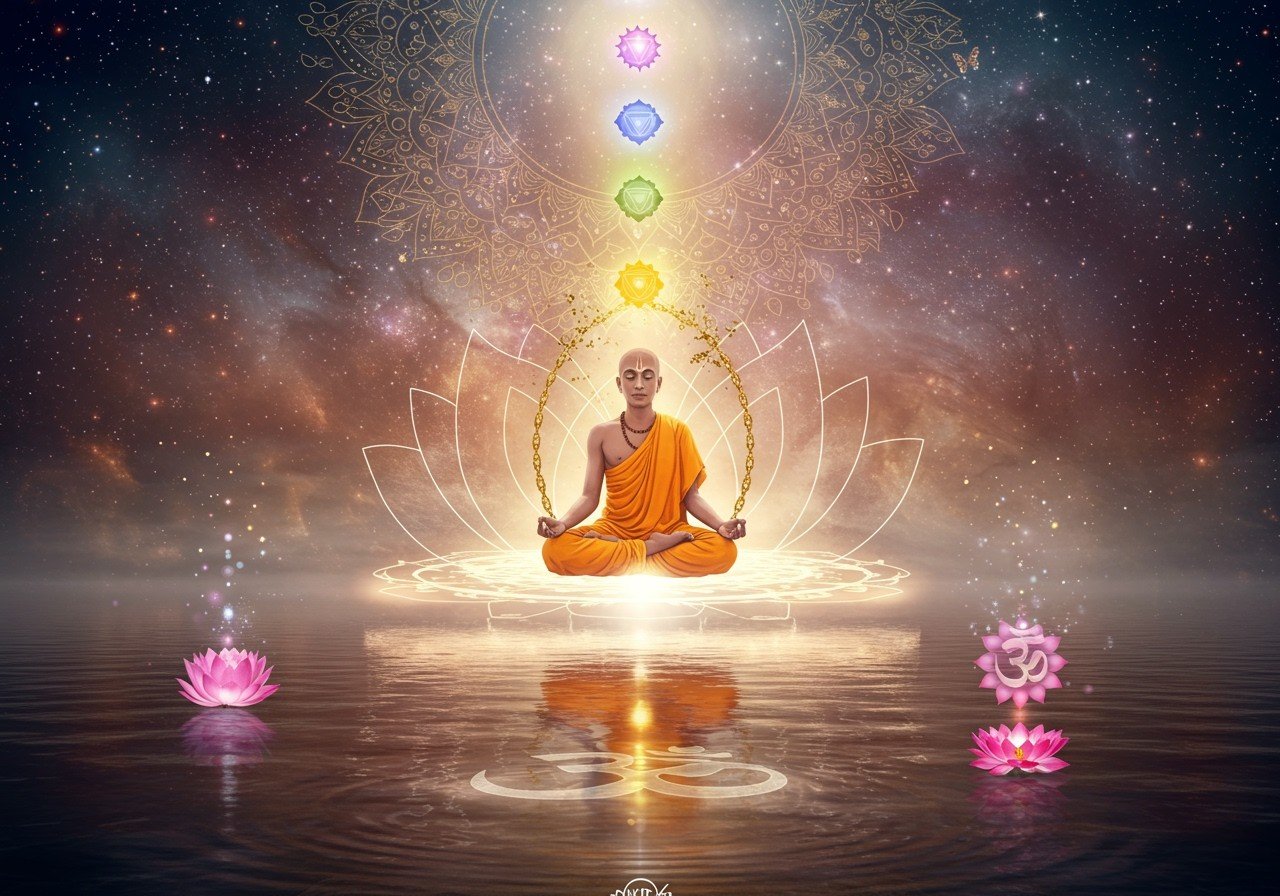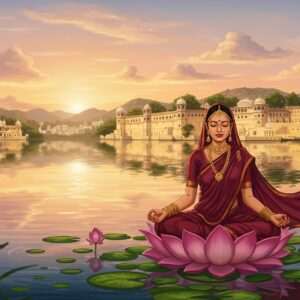
Moksha, a central concept in Hinduism, Jainism, and Sikhism, signifies liberation from the cycle of death and rebirth (samsara) and union with the Divine. It is the ultimate goal of human life, representing a state of eternal bliss, peace, and spiritual fulfillment. For many individuals seeking spiritual growth, especially those aged 25-60, understanding and pursuing Moksha becomes a significant aspiration, blending traditional beliefs with modern lifestyles. This article explores the meaning of Moksha and the paths to achieving this spiritual freedom.
Understanding Moksha
Moksha is about ending suffering and discovering your true self, leading to everlasting happiness. It represents the culmination of spiritual development, marked by a profound understanding of existence and one’s place within it. In Hinduism, Buddhism, and Jainism, Moksha holds a central position, although its interpretation and the methods to attain it might differ. Samsara, the continuous cycle of birth and rebirth, is seen as a state of suffering, and Moksha is the ultimate escape from this cycle. In the Upanishads and the Bhagavad Gita, Moksha is described as the transition from ignorance (avidya) to enlightenment (vidya), a state of complete understanding and awareness. Dharma (righteous duty) and karma (actions and their consequences) are essential elements in the pursuit of Moksha. A guru (spiritual teacher) can offer invaluable guidance and support on this path.
Pathways to Moksha
The paths to Moksha offer a journey rich in tradition and wisdom, each emphasizing different aspects of spiritual practice. Let’s explore these diverse paths:
- Karma Yoga: This path emphasizes selfless action without attachment to results. Whether it’s cooking a meal or engaging in deep meditation, any act performed with a spirit of selfless service contributes to spiritual progress. Karma Yoga encourages virtuous living, ethical choices, and the fulfillment of one’s duties, making everyday life a spiritual practice.
- Bhakti Yoga: This is the path of devotion to God. Through prayer, chanting, rituals, and expressions of unconditional love, individuals cultivate a deep and personal connection with the Divine. Bhakti Yoga emphasizes surrender to God’s love, treating all beings with acceptance and non-judgment. Specific methods of Bhakti Yoga include listening to sacred stories, chanting hymns, performing ritual worship, and complete surrender to God.
- Jnana Yoga: This path focuses on knowledge and wisdom as the means to liberation. Through studying sacred texts such as the Upanishads and Bhagavad Gita, seeking guidance from spiritual teachers, and engaging in self-reflection, individuals gain a deeper understanding of the true nature of reality and the self. Jnana Yoga aims to make one aware of their eternal soul, recognizing that intellectual understanding is distinct from self-realization. Key practices include cultivating tranquility, restraint, withdrawal from sensory distractions, acceptance, trust, and focused concentration.
- Raja Yoga: This path utilizes meditation and mental discipline to achieve inner peace and self-mastery. It involves purifying the conscience through ethical behavior, stabilizing the body through correct posture (asana), and controlling the breath (pranayama) to steady the nervous system. Through these practices, the mind becomes calm and focused, creating a conducive environment for spiritual growth and realization.
Key Concepts & Practices for Achieving Moksha
- Detachment: Letting go of material desires, attachments, ego, fear, anger, and frustrations is essential for spiritual progress. These negative emotions bind us to the earthly realm and hinder our journey towards liberation. Detachment involves recognizing the impermanent nature of material possessions and cultivating a sense of non-attachment to worldly outcomes.
- Self-Control: Physical, mental, and emotional self-control are vital components of spiritual discipline. This includes maintaining composure in challenging situations, practicing mindful speech, and refraining from violence in thought, word, and deed. Self-control enables us to manage our impulses and cultivate inner peace.
- Self-Realization: Understanding the true self and its connection to the Divine is at the heart of Moksha. Self-realization involves recognizing the inherent divinity within oneself and realizing one’s true nature beyond the limitations of the ego and the physical body. This realization leads to a deep sense of peace and interconnectedness.
- Dharma: Following a mode of conduct that is aligned with spiritual principles is crucial. Dharma encompasses ethical behavior, righteous living, and fulfilling one’s duties in accordance with cosmic order. Adhering to dharma supports spiritual growth and helps create positive karma.
- Guru: Seeking guidance from a qualified spiritual teacher is highly beneficial. A guru can provide wisdom, support, and practical instruction to help overcome spiritual obstacles and accelerate progress on the path to Moksha. The guru’s guidance illuminates the path and provides valuable insights into the spiritual journey.
Additional Considerations on the Path to Moksha
- Moksha in Kaliyuga: In the current era, known as Kaliyuga, some believe that liberation can be achieved through the “Akram path,” a stepless path that emphasizes direct self-realization through the grace of an enlightened being (Gnani). This path is considered especially relevant in the present age, which is believed to be characterized by increasing negativity and challenges.
- Liberation in Life (Jivanmukti): Some schools of thought believe Moksha can be attained in the current lifetime. This is known as Jivanmukti, or liberation while living. It involves complete detachment from negativities and achieving complete knowledge of the soul and existence, thereby experiencing the bliss of Moksha while still in the physical body.
- Importance of Good Karma: Accumulating good karma through virtuous actions and cultivating positive intentions plays a significant role in the pursuit of Moksha. Good karma creates favorable conditions for spiritual progress and purification of the mind.
- Unity with the Divine: Achieving a sense of unity or oneness with the divine energy is a core aspect of Moksha. This involves transcending the limitations of the individual ego and experiencing a profound connection with the ultimate reality.
How Poojn.in Supports Your Spiritual Journey
Poojn.in offers a wide variety of products that can support your spiritual practices and journey towards Moksha. Our curated selection helps create a sacred space conducive to meditation, prayer, and ritual worship.
- Divine Idols: Choose from our collection of brass and copper murtis to serve as focal points for your devotion and meditation practices. These sacred images can enhance your connection with the Divine.
- Traditional Puja Items: Find complete puja samagri sets, containing all the essential items for your daily worship and special ceremonies. These sets simplify your puja preparations and enhance the sanctity of your rituals.
- Sacred Texts: Deepen your understanding of Moksha and other spiritual concepts by exploring our selection of authentic spiritual literature, including the Bhagavad Gita and the Upanishads. Immerse yourself in the wisdom of these ancient scriptures.
- Meditation Essentials: Enhance your meditation practice with high-quality meditation mats, prayer beads (mala), and dhoop stands. Create a peaceful and sacred space for your meditation sessions.
- Pure Copper Items: Discover genuine copper items such as kalash and puja thalis to maintain ritual purity and amplify spiritual energy during your worship. Copper is believed to have purifying properties and is traditionally used in Hindu rituals.
Visit Poojn.in to explore our complete range of spiritual products. We provide secure packaging and delivery across India, bringing authentic spiritual items directly to your doorstep.
Note: All items are meant for spiritual and decorative purposes only.
The Journey Towards Eternal Bliss
Embarking on the path to Moksha is a deeply personal and fulfilling journey. Each tradition offers unique methods to connect with the Divine, whether it’s through selfless service (Karma Yoga), devotion (Bhakti Yoga), pursuit of wisdom (Jnana Yoga), or meditation and mental discipline (Raja Yoga). By embracing these paths with sincerity, we move closer to liberation and eternal peace.
Understanding the core principles of detachment and self-realization is crucial for navigating this spiritual journey. Practicing dharma, or righteous living, and seeking guidance from a guru can significantly enrich the experience. In the modern age, integrating timeless wisdom with the conveniences of contemporary life makes the path towards Moksha accessible and relevant for seekers from all walks of life.
Moksha is not merely a destination but a way of living that brings harmony, purpose, and fulfillment. With dedicated effort and sincere aspiration, this path promises a profound connection with the Divine and a deeper understanding of our true nature. The pursuit of liberation is a testament to the enduring power of spiritual tradition, offering hope for a life infused with peace, joy, and eternal bliss.


